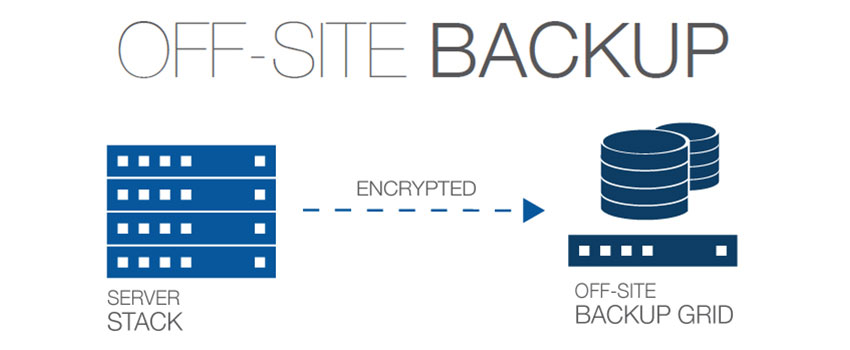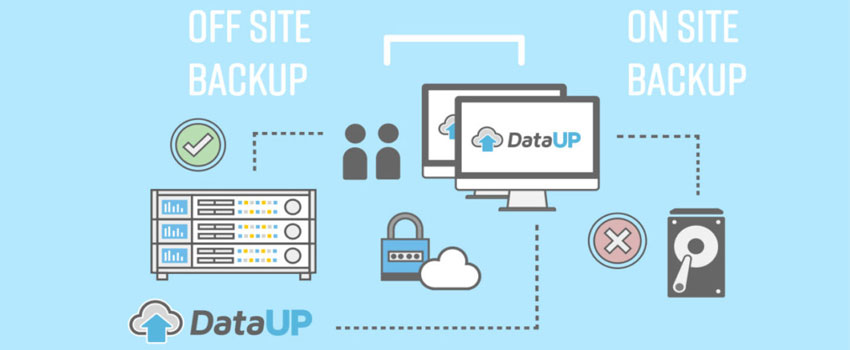Offsite Backup– Data in this era is seen as the most precious and valuable asset. Interestingly such unprecedented popularity is being shared both by individuals and organizations, whether it is an album of last year’s vacation, sales report or some highly confidential document having corporate secrets. In the event of a disaster, data loss or theft is the last thing anyone wants to hear about his or her important data.
For the last few years, there has been a huge growth in the awareness regarding the enactment of data backup services. But there are still questions on the effectiveness and efficiency of the backup and recovery methods. There is a very simple understanding that how efficient will a backup method be if it is being managed in the same place as that of data source? Obviously, what will happen to the data source, the same will happen to the data backup.
So, in this way, yes! there is a presence of backup method. But there exist serious concerns on the quality of the subjected backup method. To remove this shortcoming in the backup method, many organizations opt for an offsite or online backup solution. The data backup off site method enables the users to make the data backup more secure and have minimal damage in case of data loss. It is so because when it comes to data, risk will always be associated. But still the risk, in case of offsite backup, will be of a safe nature.
Offsite Backups
There isn’t any straight forward way to define offsite backups. Such confusion exists because many IT professionals take this idea as they are talking about different types of data backups such as backup on magnetic tapes, disk backup or backup on cloud storage. However, in general terms, offsite data backup is such a method of backup where backup infrastructure is being managed outside of the company’s vicinity.
In other terms, it can also be inferred that data is being sent out of the company’s premises or building. Basically, a backup will not be managed in the way primary data is being stored. This definition further opens up ways for two modes of offsite backups. Their detail is as follows:
Physical Storage
This is quite a broad type of offsite data backup. This system can be as simple as making copies of the data on the removable storage devices such as external hard drives and flash drives. This may include parking of these storage media on the location, other than a data center. However, this system can also be as sophisticated as backing up an entire system on the tape drives or any other external drive and then storing these backups on some offsite location.
Remote Backup
This is a rather modern, yet simplest form of performing offsite data backups. In this methodology, data will be stored on third-party servers. These third-party servers are typically located on some far-flung or offsite vicinity. Generally, these types of data backups are also known as “cloud backups”
Why Offsite Backups are Important?
With the growing data vulnerabilities and confidentiality, the employment of offsite backup solutions as a disaster recovery plan is increasing manifold. Everyone is concerned about the security of their data and for this, nothing could be as secure as storing them in such a place where they’ll remain free from any in-house disruption. In today’s paradigm, the physical transport method does not have any sound standing. So, in this lieu, it can be said that most of today’s offsite backups are centred on the principle of remote backups.
To have a detailed insight on the importance of offsite backups, let’s have a look at their benefits:
Reliability
Reliability is the major benefit of offsite backups. The reason they are reliable lies in the automation of the backup process. User’s files and documents will automatically be backed up to the remote server, as per the defined schedule. To further staunch the reliability, data of a user is saved on multiple servers, each being in different locations. This is done to ensure that irrespective of any technical issue, users should always be able to access their data.
Reduction in the Workload
Workload optimization is one of the prime reasons due to which it can be said that offsite backups are extremely important to be employed. Traditional backup software requires an individual or dedicated IT staff to manually backup the concerned files. This does not only take time but also distracts people from their original job.
But with the introduction of offsite backups, backups solutions are triggered just over a mouse click. Furthermore, backup scheduling also lets backups to continue autonomously, even if someone is not there.
 Easy Setup
Easy Setup
Offsite backup solutions are usually provided and managed by IT companies. They have their dedicated maintenance and network management staff whose only job is to manage and do most of the backup job on the back end. Users will just need to specify the folder and the frequency on which backups must be performed. The rest will be done by the backup cloud service provider.
Security
Since offsite backups are being managed on some remote location so it automatically increases the physical security of the overall backup network. To further increase data protection, most of the backup solutions use advanced encryption tools. This makes data blind for everyone except the owner of the data.
Cost Optimization
Cost optimization is the brightest side of the offsite backups. Consider a situation where ten computers are configured with the organization’s IT infrastructure. Every computer holds a substantial amount of data. In this situation, having physical backup storage for each computer can amount to a hefty cost.
On the contrary, offsite backups are billed on a monthly basis with unlimited storage. Moreover, their monthly plans support multiple computers. So, for any organizational setup with large storage needs, offsite backups are extremely important. Not only will it bar the organization from bearing unnecessary maintenance cost, but also let them save a lot in terms of operational cost.



